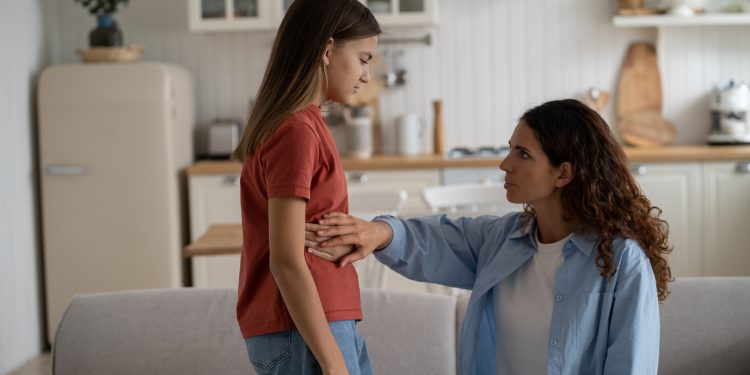Mom I got my first period : A guide
For many girls, getting their first period can be a confusing and sometimes scary experience. It’s important for parents to be there to guide their daughters through this transition and help them feel comfortable and confident. It’s also very important to make young girls understand that this phase of life is very normal and natural. In this interactive article, we’ll discuss some important things that both parents and daughters should know about periods and provide some tips on how to make this experience as positive as possible.
Below are some expected questions on first periods:
- What is a period?
A period is a part of the menstrual circle also know as menstrual flow.. It’s when blood and tissue from the lining of the uterus are shed through the vagina. The menstrual cycle is controlled by hormones and usually occurs once a month, although it can vary from person to person. It normally lasts between 3 to 7 days.
- When can I expect to get my first period?
Girls usually get their first period between the ages of 8 and 15. It’s important to remember that everyone is different, so there’s no “right” age to get your first period. Some girls may get their period earlier or later Than others.
- How can parents talk to their daughters about periods?
It’s important for parents to have open and honest conversations with their daughters about periods. They should make sure their daughters know what to expect and answer any questions they may have.
Like me, my mum, being a young widow with six children, was busy working hard to fend for her children thereby practically neglecting her first daughter (being her 5th child). I was overly naïve about all these things. Mine came at age 12. But I was lucky it didn’t take me all unaware having had some discussions with my peers as regards periods a day before I started seeing my period! So when I saw it, I knew this was it. We just spoke about it yesterday. I was excited and rushed to use a piece of cloth not knowing exactly how to do it because we never discussed in details.
Later on, my mum saw the stain on me and then came to my rescue! Funny right? But this has been the experience of several many other women out there. Mothers need to understand how very important it is to pay close attention to their daughters from early ages of life. I have a little daughter who’s going to be 4 years this month and I have prepared my mind to talk her through all these in the most tiniest language possible for her easy understanding. It’s very pertinent!
So, here are some tips for talking to your daughter about periods:
Start the conversation early: It’s a good idea to start talking to your daughter about periods before she gets her first one. This will help her feel prepared and less anxious. Like I said above of my soon to be 4 years old daughter.
Use proper terminology: Make sure you use the correct names for body parts and functions. This will help your daughter feel more comfortable and confident when talking about her body. Also use very simple language for easier understanding.
Be positive: Try to make the conversation positive and emphasize that getting your period is a normal part of growing up. Tell her it’s natural and happens to every girl beginning from a certain age.
Address any concerns: If your daughter has any concerns or fears about getting her period, make sure you address them and provide reassurance.
- How can I prepare for my first period?
Girls can prepare for their first period by:
Keeping a supply of pads or tampreassurance: It’s a good idea to keep some pads or tampons in a discreet location, like a purse or backpack, so they’re always available when needed.
Wearing comfortable clothing: Girls may want to wear loose-fitting clothing or clothing made of breathable fabrics during their period.
Practicing good hygiene: It’s important to change pads or tampons regularly and to wash the genital area with soap and water. You should emphasize this for your girl. And let her know this is done to avoid getting bacterial infections.
- What should I do when I get my first period?
When a girl sees her first period, she should:
Tell a trusted adult: It’s important to let a trusted adult, like a parent or teacher, know when you get your first period so they can provide support and guidance.
Use pads or tampons: Girls should use pads or tampons to absorb menstrual blood. Use of clothes is not advisable and the use of tissue paper is highly prohibited at it can cause infection.
Change pads or tampons regularly: It’s important to change pads or tampons every few hours to prevent leaks and to maintain good hygiene.
Keep track of their menstrual cycle: Girls may want to start tracking their menstrual cycle so they know when to expect their next period.
Conclusion:
Getting your first period can be a confusing and sometimes scary experience, but it’s important to remember that it’s a normal part of growing up. Parents can help their daughters feel prepared and confident by having open and honest conversations about periods and providing support and guidance. Girls can prepare for their first period by keeping a supply of pads or tampons on hand, wearing comfortable clothing, and practicing good hygiene. With the right information and support, girls can feel confident and comfortable during this important transition.










Discussion about this post